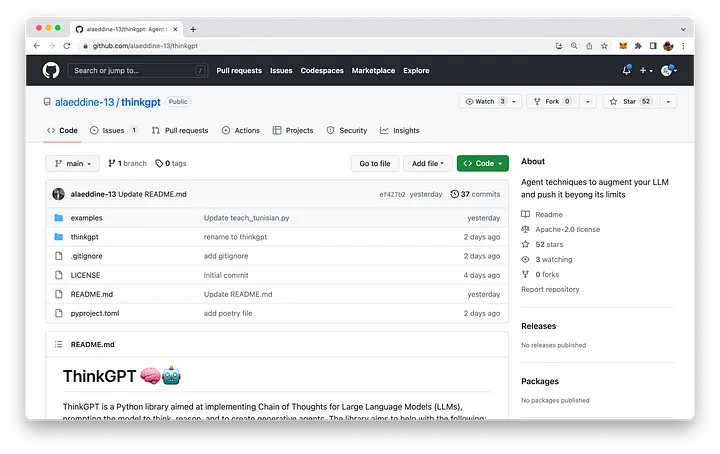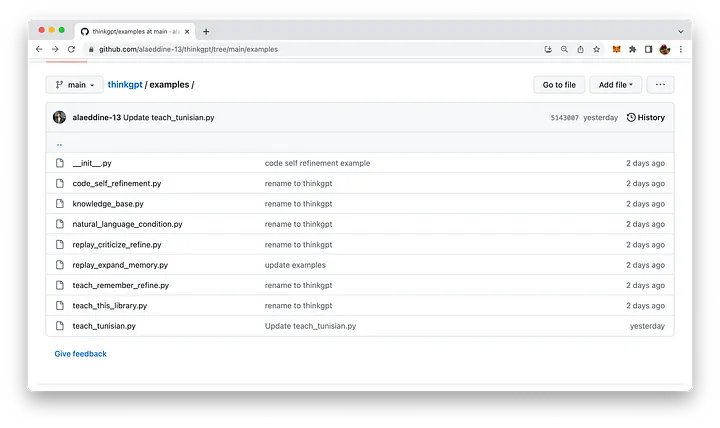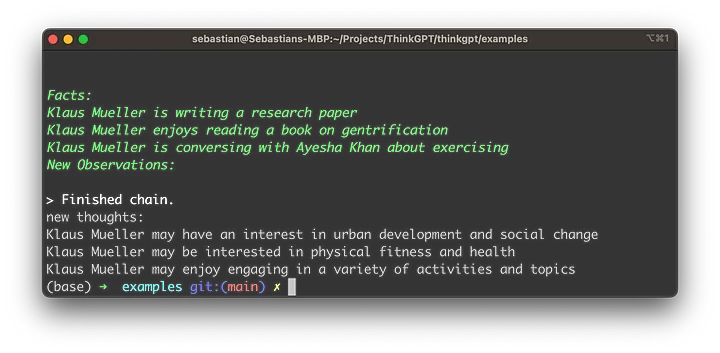
ThinkGPT is an innovative Python library that empowers large language models so that they can think, reason and act more efficiently. If you are eager to integrate ThinkGPT into your Python scripts and take advantage of its advanced features, then please read this article. This article will guide you through the first steps of using ThinkGPT in your Python project.
We will explore ThinkGPT’s core features, including its advanced memory capabilities, self-improvement mechanisms, and high-order reasoning capabilities. You'll be able to discover how this innovative library is changing the AI development landscape, and learn how to harness its power to enhance your own projects.
ThinkGPT is hosted on GitHub. The code base can be found at: https://github.com/alaeddine-13/thinkgpt.

Installing ThinkGPT is simple and can be installed using pip:
pip install git+https://github.com/alaeddine-13/thinkgpt.git
This command will install the ThinkGPT library directly from the GitHub code repository.
After the installation is complete, you can start using ThinkGPT in Python scripts. To do this, simply import the ThinkGPT class from the thinkgpt.llm module and create a new instance of the class:
from thinkgpt.llm import ThinkGPT llm = ThinkGPT(model_name="gpt-3.5-turbo")
This code snippet uses the specified model (in this case " gpt-3.5-turbo") initializes a new ThinkGPT instance.
With a ThinkGPT instance, you can now use the memorize() method to teach your AI model new concepts or facts:
llm.memorize(['DocArray is a library for representing, sending, and storing multi-modal data.'])
To recall memorized information, you can use remember() Method:
memory = llm.remember('DocArray definition')
Once the AI model has learned some information, you can use the predict() method to make predictions or answer questions based on the memory data:
llm.predict('what is DocArray ?', remember=memory)
This code snippet uses the remember() method to retrieve memory information and feed it back to the predict() method to answer the question.
ThinkGPT comes with some easy-to-understand usage examples. The corresponding Python script can be found in the example folder of the code repository:

Let's take a closer look at one of the examples provided: replay_expand_memory.py:
from thinkgpt.llm import ThinkGPT llm = ThinkGPT(model_name="gpt-3.5-turbo") # 加载旧内存 old_memory = [ "Klaus Mueller is writing a research paper", "Klaus Mueller enjoys reading a book on gentrification", "Klaus Mueller is conversing with Ayesha Khan about exercising" ] # 教给LLM旧的记忆 llm.memorize(old_memory) # 在旧记忆的基础上诱发反思 new_observations = llm.infer(facts=llm.remember()) print('new thoughts:') print('\n'.join(new_observations)) llm.memorize(new_observations)
In this ThinkGPT example script, the goal is to induce new thoughts or observations based on existing information by Klaus Mueller using the ThinkGPT library.
Before executing the script and viewing the results, we need to obtain the OpenAI API key and set the key value of the corresponding environment variable OPENAI_API_KEY.
To obtain an OpenAI API key, follow these simple steps:
export OPENAI_API_KEY="YOUR OPENAI API KEY"
现在我们已经准备好执行脚本了,只需输入以下命令:
python replay_expand_memory.py
然后,你应该能够看到类似于以下的结果:

ThinkGPT是一款强大的Python库,它通过添加先进的记忆、自我完善、抽象和推理功能,增强了大型语言模型的能力。它对用户友好的安装过程和Pythonic API使它成为许多AI项目的有价值的补充。通过探索本文提供的实际示例,你可以利用ThinkGPT的能力,彻底改变你的AI思考方式、得出结论和采取行动的方式。
The above is the detailed content of Explore ThinkGPT: the cutting-edge Python library that turns AI into powerful thinking machines. For more information, please follow other related articles on the PHP Chinese website!




